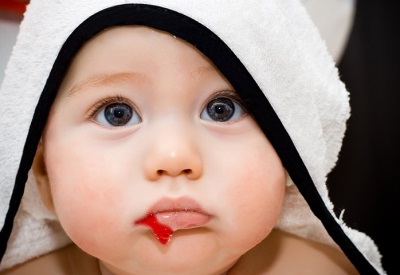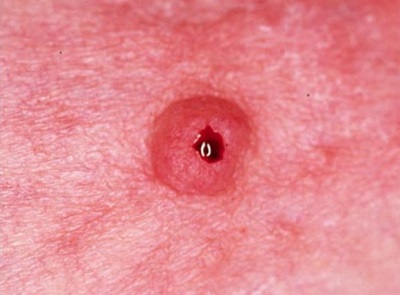What if the child burped with blood?
Most women after childbirth experienced regurgitation, because almost every newborn spit some feminine milk or infant formula after feeding. This process is physiological and normal, if the volume of the regurgitated is small, and the general condition of the toddler is not broken. So the baby "gets rid of" the air swallowed during feeding, as well as from excess food, which got into his tiny stomach with active sucking along with the air.
However, sometimes regurgitation is a symptom of the disease, and if mother sees blood in milk, it is always scary. Is it dangerous to regurgitate with blood and why it happens in babies, and also what to do to the mother if the infant burped milk, in which there is an admixture of blood?
Why is regurgitation with blood
The most common cause of regurgitation with milk, in which blood is present, is the infant's ingestion of blood during sucking, when there are cracks on the mother's nipples. If a woman has very sensitive nipples, whose skin bursts easily when feeding babies, blood from such cracks will fall into the toddler's stomach with food, and during regurgitation, her mother will notice her admixture in milk, which the baby will “return”.
The second, less frequent cause of spitting blood is damage to the blood vessels of the digestive tract of the baby. This is a very serious problem, which helps to diagnose additional examinations of the child.
A newborn baby may also burp with blood on the first day of life if he swallowed amniotic fluid during birth. This is a fairly common situation that does not indicate any pathology.

What to do
Having noticed streaks of blood in the milk that the baby burped after feeding, you should carefully observe the behavior of the infant.
The main thing is to make sure that the child does not have vomiting:
- Unlike regurgitation, when the milk is released without much stress, vomiting will be accompanied by a strong tension of the abdomen.
- When regurgitation occurs, undigested milk is excreted, which the baby has just swallowed, and the vomit may be partially digested food, as well as include mucus, bile and other impurities.
- Regurgitation occurs almost immediately after feeding, and bouts of vomiting are possible at any time.
- The general condition of the baby during regurgitation is not disturbed, and if the infant has vomiting, which is a symptom of the disease, it will be restless, capricious, drowsy, sluggish. In addition, often with vomiting, the body temperature of the crumbs rises.

You should also inspect the nipples - if they appear cracks, then they are the cause of blood during regurgitation. If the mother’s nipples are intact, and blood appears during spitting repeatedly, the baby should be taken to the doctor’s appointment. There are also other warning signs that require immediate medical examination.
When to see a doctor
Mom should immediately show the crumbs to the pediatrician if:
- After regurgitation with an admixture of blood, the child became agitated or began to cry a lot.
- The baby spits up from time to time with blood and gains weight poorly.
- The volume of milk released during regurgitation of blood-streaked blood is very large (more than two teaspoons), which leads to the idea of vomiting.
Such symptoms may indicate a disease in the infant, therefore, it is not necessary to delay in seeking medical help.












